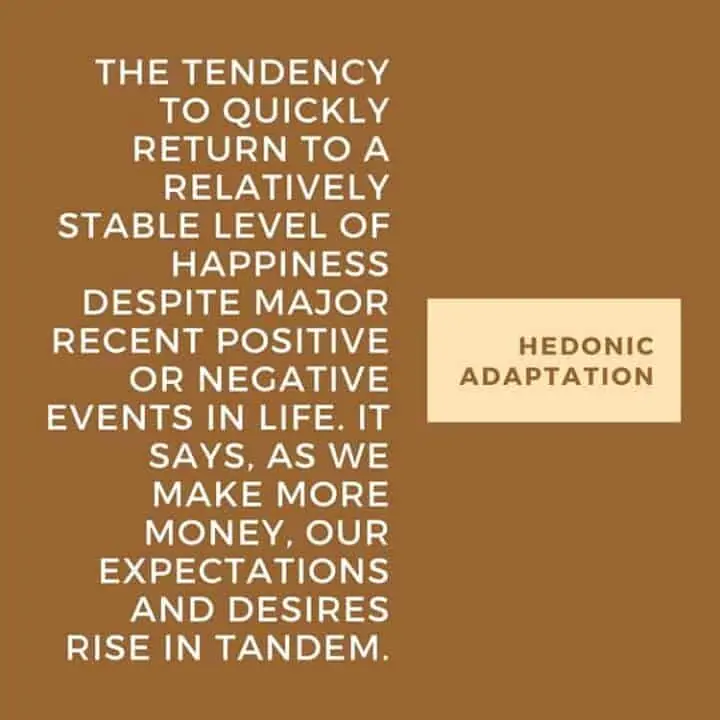Today's Saturday • 8 mins read
You finally achieve your goal. You are deliriously happy.
Then, you start to feel like achieving this success isn’t actually as much fun as you thought it would be.
After a while, you begin to feel that your less-than-expected happiness is fading away. You even feel a bit of sadness that it melted away so soon.
When success finally arrives, why doesn’t your happiness seem as great or last as long?
And how can you manage the sense of loss that comes with it?
The “Arrival Fallacy” In Psychology
“Arrival fallacy” is the illusion that “once we make it, once we attain our goal, or reach our destination, we will reach lasting happiness,” in the words of Tal Ben-Shahr, the happiness expert who coined it. It is the mistaken belief that we should wait for happiness until we achieve our goal or reach our destination.
It comes from arrival signifying reaching a desired place or goal, and fallacy meaning a mistaken belief, especially one based on unsound arguments.
The phrase was invented by Tal Ben-Shahar, one of the pioneers in the field of positive psychology. For reference, positive psychology is the psychology of happiness.
He explains that people who have arrival fallacy are often unhappy people who work toward a goal thinking success will fix their sadness.
But when they reach that goal, they find that it doesn’t solve their unhappiness. Moreover, the happiness spike that success brought goes down soon.

As a result, they feel disappointed, hopeless, and depressed. The arrival fallacy often worsens their unhappiness and mental state.
The arrival fallacy is a form of cognitive bias in which people expect a future event to produce consistent and constant positive emotions.
This bias leads to the creation of unrealistic expectations around a future event, while ignoring all the struggles and problems that could occur in life afterward.
- It makes us falsely assume that once we achieve our objective, we will no longer have to suffer or worry since we will have achieved long-lasting joy.
- It fosters a happiness myth in which a person believes that “when I make it, then I’ll be happy.”
Arrival fallacy is also called the happiness fallacy, destination fallacy, and summit syndrome.
Arrival Fallacy Psychology: Why Achieving Goals Doesn’t Make You Happy
When we achieve goals and happiness that we have always coveted, why does the good feeling not last for long?
Here are the reasons why achieving goals doesn’t make us happy forever:
1. Wrong Social And Parental Conditioning
We are conditioned to believe that if we achieve our goals, then we will be happy. This is false conditioning since it wrongly assumes that our life will be trouble-free after achieving success.
2. Hedonic Treadmill or Hedonic Adaptation (Getting Used To Rewards)
Happiness is fleeting when it does not come from within but from external factors such as money, people, objects, and events. The main reason for this is a hedonic adaptation, which means our minds quickly adapt to the new level of happiness.

3. Creating New Goals Without Pausing To Relish
We are quick to set up new goals. The positive feelings of accomplishment do not last for long after we achieve a goal because there is another goal waiting in line.
4. Ignoring That Happiness Depends On Many Factors
Achieving a goal is just one of the many factors that contribute to our happiness. We choose to remain unmoved by all those positive events that happened to us on our journey to goal achievement.
5. Fear of Happiness or Loss of Good Luck
Some people are cherophobic, which means they are afraid to let themselves be happy without concern.
They feel that if they let themselves be happy, then the good fortune bestowed on them might go away or be taken away,
Moreover, they feel that being too happy may make them unsuitable to tolerate and cope with future problems.
6. Dependence On Dopamine Release And Its Decline
The dopamine boost that comes with the achievements fades away. Dopamine is a neurotransmitter that is involved in reward-motivated behavior, released when we reach a goal.
Dopamine is a pleasure-giving neurochemical. It stimulates the brain’s pleasure centers and is responsible for feelings of happiness. Dopamine also plays a role in motivation, cognition, learning, memory, sleep, attention, control of movement, and mood regulation.
However, it does not stay at the same level since it gets metabolized and absorbed away. When it is broken down, the pleasure is reduced.
Unfortunately, dopamine also has social importance as the neurotransmitter that plays a central role in the mechanism of action of the major substances of abuse, dependence, and addiction.

How do you overcome the arrival fallacy?
Three strategies to overcome the happiness fallacy are:
- Avoid happiness forecasts based on “if this/then that” or “when it happens/then that will happen.”
- Focus on the journey rather than the destination, and do not be too hard on yourself.
- Celebrate the small victories and micro-moments of joy.
What happiness myths does arrival fallacy create?
Arrival fallacy creates the happiness myth of “conditional happiness,” that one can only be happy when a condition is fulfilled.
It may lead people to say:
“I’ll be happy once I reach that goal. Until then, it’s okay for me to stay unhappy.”
When you always think along those lines, it makes your current life unhappy.
- When you say you’ll be happy in life once you marry, then you might mean to say that you can’t be satisfied as long as you’re single.
- When you announce your life will fill up with happiness once you meet your financial goal, then you might mean to say that you can’t be happy until you’re money-rich.
- When you tell others you’ll make yourself happy once you move into a big house, then you might mean to say that you can’t be happy while living in your small home.
When you pursue a critically positive change in your life — success, money, love, spouse, kids, accolades, position — you often fall back into thinking that once it happens, it will start an unending spell of happiness.
With that line of thinking, what you wrongly tell yourself is this: Success will replace my unhappiness with happiness.
Do accomplishments make you happy forever?
No, success and accomplishments cannot make us happy forever or remove our unhappiness permanently Success is only one of the causes of happiness, not the only one. Even after attaining our life’s most important goal, we may have to confront a slew of unexpected challenges.
If you’re not happy to begin with, then success won’t make you any happier.
Don’t let anything for your future happiness become a source of your present unhappiness.
You’ve tied your reasons to be happy in life to your successes, but goals and success are things outside yourself. You can’t fully control them. Therefore, your plans to control your happiness also fall flat.
So, why do you want to postpone your happiness until success enters your life? Why do you choose to be unhappy now?
What is the achievement fallacy?
Why are we so negative?
Over millions of years, the human brain has evolved into a structure that is inclined towards taking in the bad more than focusing on the good. So, evolution-wise, we have gradually become a species more focused on the negative.
Our brains are constantly changing by slowly reshaping our neural structures. It is something called neuroplasticity.
Therefore, what started as a behavior change towards the negative, neuroplasticity made it into a permanent change in the organic structure of the brain.
Final Words
We can allow ourselves to be happy in the present without jeopardizing our future happiness.
Positive psychology shows that there are exercises called positive psychology interventions (PPI) that we can regularly practice that can reshape our brains to have a more positive outlook.
These interventions promote new neural pathways for happiness.
“You have the ability to control how you feel—and with consistent practice, you can form life-long habits for a more satisfying and fulfilling life.” — Acacia Parks, Ph.D.
√ Also Read: How To Have An Whole Happy Day?
√ Please spread the word if you found this helpful.
» You deserve happiness! Choosing therapy could be your best decision.
...
• Disclosure: Buying via our links earns us a small commission.